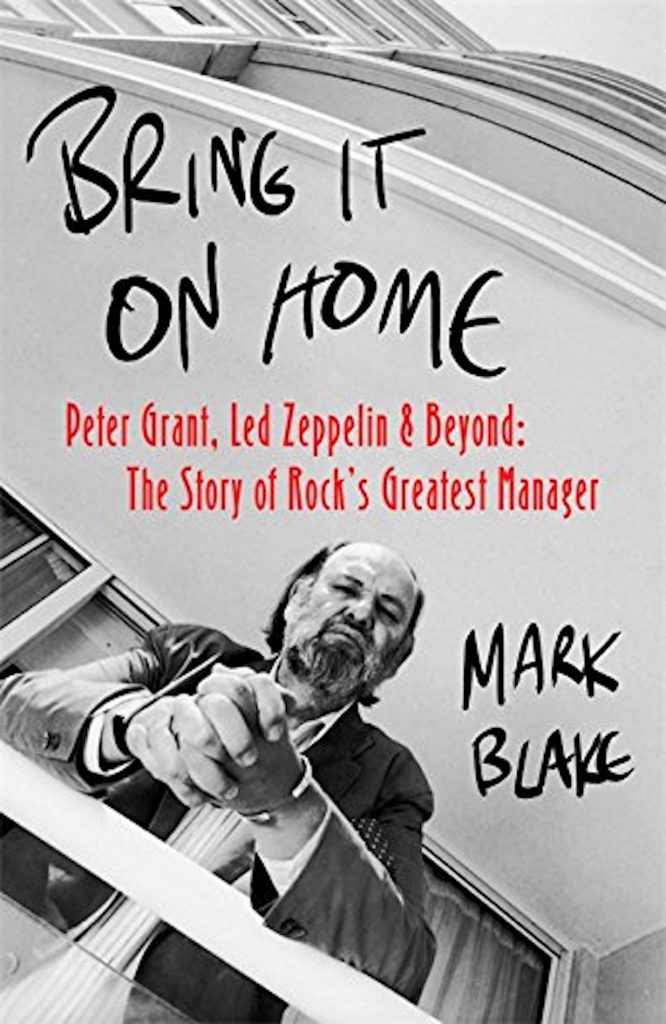Peter Grant is in many ways the forgotten member of Led Zeppelin. No, he wasn’t on stage with the band playing an instrument or singing in a woman’s blouse, but Grant was largely responsible for Led Zeppelin’s rise from an offshoot of The Yardbirds to the biggest band in the world.
Mark Blake’s new book, “Bring It On Home,” follows the rise of Peter Grant from a showbiz hanger-on, playing bit parts in films and television shows to a titan of the music industry, using his heavyweight reputation (and physical size) to strong-arm promoters into giving Led Zeppelin the best deal possible.
Grant never knew the identity of his father, and his childhood was marred with instability. But when Grant found his way into London’s Soho in the fifties and sixties, he discovered an entertainment industry that was fertile ground for someone willing to devote himself to his acts – and to making sure that the bag of cash takings was always secured after the show.
Blake’s book vividly describes this environment, where fading stars like Gene Vincent required someone with Grant’s dedication in order to sometimes literally prop them up on stage.
But the emergence of a new, more exciting breed of rock bands quickly displaced the more twee pop of groups like Herman’s Hermits.
Grant’s allegiance with Jimmy Page would becoming his defining professional relationshiop, allying him to the man who would become the creative leader of Led Zeppelin. Page handled the music, and Grant handled the money.
Their partnership was vital from the earliest days of the band, where Page and Grant funded Led Zeppelin’s debut album themselves and managed to secure a $200,000 check from Atlantic Records. It was a masterful coup, and the kind of deal that only Peter Grant was able to make.
The book is more than just the story of Led Zeppelin, though. This is the story of how Grant juggled his role as a doting father with his other life as the manager of the world’s biggest, and most hedonistic, rock band.
Blake spends many pages portraying life at Horselunges, Grant’s East Sussex manor complete with a moat, drawbridge and security cameras. From this mansion, Grant would look after both his family and his band – although Led Zeppelin arguably became just as much of a part of his family as his two children, Warren and Helen Grant.

The tales of excess familiar to anyone who has read newspaper coverage of Led Zeppelin or Stephen Davis’ book “Hammer Of The Gods” are here: The red snapper incident, the groupies, the drug addictions which took hold of the band.
But this book also charts the descent of Grant into his own private hell of drug addiction and paranoia, as he gradually lost his grip on Led Zeppelin.
Grant retreated into his mansion, accompanied by minders and loyal employees including Richard Cole. Blake describes numerous incidents of three-day meetings fuelled by cocaine, of motorbikes dropped from helicopters, and of Grant locked in his bedroom, watching visitors arrive through his security cameras and listening to them through a recording system.
There are many entertaining stories in the book. Many will even be new to fans of Led Zeppelin who have read existing accounts of the band’s career.
Led Zeppelin in 1977 was a band falling out of fashion, bloated by excess and drug addiction and struggling to continue their musical ascendence. But the band still sold out arenas in the US.
However, it was as 1980 approached that Led Zeppelin collapsed, as did Grant’s marriage. Reading this book, you can see the lives of Grant and Led Zeppelin gradually reach a tipping point. It’s a sad, sinister tale, filled with stints in jail, theft, vast sums of money and rumours of mob connections.
But Grant survived Led Zeppelin (his marriage, however, was less resilient) and gradually managed to kick his dangerous cocaine habit. One by one, the surviving members of Led Zeppelin dropped him. Led Zeppelin’s Swan Song label also shuttered, leaving Grant with little involvement with the current music industry.
The book does have a pleasant ending, though, with Grant moving out of his mansion and into a smaller property in Eastbourne. He lost weight and adopted a healthy diet and simpler lifestyle, free of the burden of managing Led Zeppelin.
Grant’s death in 1995 marked the end of an era – the death of one of the last titans of the music industry. The managers may not have been the people in the posters included in NME and Melody Maker, but they were the quiet (or sometimes not so quiet) force behind global successes such as Led Zeppelin, Elvis Presley, and The Who.
Peter Grant played as large a role in making Led Zeppelin a success as any of its band members, and Blake’s book is an excellent depiction of his life.
You can buy “Bring It On Home” on Amazon here.

I was lucky enough to receive this for Christmas – what a read ! Highly recommended for all LZ fans.
No shortage of LZ reading. But who, from the late 60’s, ever reads? LOL….. Oh… sorry…. I do read about great motor cars that would be fine drives to listen to Trampled Under Foot.
Otherwise, it’s just old war stories.
LZ was a heavy scene and really negative. It destroyed their lives. Robert will not have it but still loves the music but not the band as a collective as it is nasty energy. The book shows this well. John Paul Jones wanted to leave after 73 tour. Then dope, near murder then deaths followed. Bad trip. Good albums. Good Book and very revealing if read closely.
Spot on Wishbone Ash !
PG chased me around the stage at Bath 1970
after he reneged on a deal to film them there. hits and pieces remain of the show that broke them as a big band. Grant did not catch me but ruined a good opportunity for the band and me.